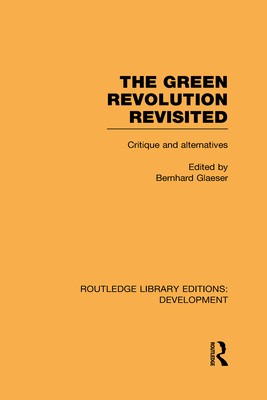
- Išsiųsime per 10–14 d.d.
- Leidėjas: Routledge
- ISBN-10: 0415592496
- ISBN-13: 9780415592499
- Formatas: 15.6 x 23.4 x 1.4 cm, kieti viršeliai
- Kalba: Anglų
- Extra -15 % nuolaida šiai knygai su kodu: ENG15
The Green Revolution Revisited + nemokamas atvežimas! | knygos.lt
Atsiliepimai
Aprašymas
The Green Revolution - the apparently miraculous increase in cereal crop yields achieved in the 1960s - came under severe criticism in the 1970s because of its demands for optimal irrigation, intensive use of fertilisers and pesticides; its damaging impact on social structures; and its monoculture approach. The early 1980s saw a concerted approach to many of these criticisms under the auspices of Consultative Group on International Agricultural Research (CGIAR). This book, first published in 1987, analyses the recent achievements of the CGIAR and examines the Green Revolution concept in South America, Asia and Africa, from an 'ecodevelopment' standpoint, with particular regard to the plight of the rural poor. The work is characterised by a concern for the ecological and social dimensions of agricultural development, which puts the emphasis on culturally compatible, labour absorbing and environmentally sustainable food production which will serve the long term needs of developing countries.
EXTRA 15 % nuolaida
Kupono kodas: ENG15
Akcija baigiasi už 3d.23:41:29
Nuolaidos kodas galioja perkant nuo 10 €. Nuolaidos nesumuojamos.

- Leidėjas: Routledge
- ISBN-10: 0415592496
- ISBN-13: 9780415592499
- Formatas: 15.6 x 23.4 x 1.4 cm, kieti viršeliai
- Kalba: Anglų
The Green Revolution - the apparently miraculous increase in cereal crop yields achieved in the 1960s - came under severe criticism in the 1970s because of its demands for optimal irrigation, intensive use of fertilisers and pesticides; its damaging impact on social structures; and its monoculture approach. The early 1980s saw a concerted approach to many of these criticisms under the auspices of Consultative Group on International Agricultural Research (CGIAR). This book, first published in 1987, analyses the recent achievements of the CGIAR and examines the Green Revolution concept in South America, Asia and Africa, from an 'ecodevelopment' standpoint, with particular regard to the plight of the rural poor. The work is characterised by a concern for the ecological and social dimensions of agricultural development, which puts the emphasis on culturally compatible, labour absorbing and environmentally sustainable food production which will serve the long term needs of developing countries.




Atsiliepimai